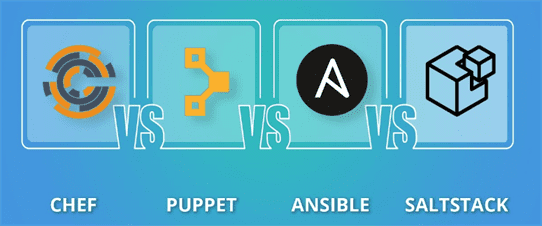Tag: Puppet
The Best DevOps Tools for Infrastructure Automation
Today, DevOps teams try to utilize automation as much as possible. This is to cut down on the sheer number of repeatable processes to limit man-hours worked, throttle development efforts, and to reduce the possibility of errors. This is also a business necessity to reduce overhead costs, increase the speed of the CI/CD process and increase customer satisfaction. There are multiple individual areas that need to be automated to have a fully autonomous infrastructure. Luckily, there are various tools we can take advantage of to help us automate our infrastructure and make sure we have well-developed DevOps processes. In this article we will go over the several of the best DevOps tools for our infrastructure systems.
Which one is appropriate for you?

Table of Contents
I. Puppet
II. SaltStack
III. Chef
IV. Ansible
IV. Conclusion
Introduction
Configuring a single server with the required software is a reasonably simple task. However, if numerous servers need to have the same or similar software and configurations installed on them, the process would use numerous man-hours to complete, which would deplete your already strained resources. Without some form of automation, this task can become nearly insurmountable. With this task in mind, new configuration management tools were developed to address the need to deploy new servers with premade configurations and updates, that allowed for a smoother and more manageable automation process. To keep these servers syncing and to manage updates across a broad swath of hosts in a data center or cloud environment, automation tools like Puppet, SaltStack, Chef, and Ansible meet this need.
What is Chef?
Chef is a popular, open-source, IaC (Infrastructure as Code) management tool. It eases administration, configuration, and deployment of server resources across a network from a central location.
Install Puppet on Ubuntu 18.04
What is Puppet?
In this tutorial, we will install Puppet on a Ubuntu 18.04 server. Puppet is an open core, server based, task management type of automation software that is primarily used to limit your interactions for many of the mundane, day to day server tasks that used to require personal intervention.
Installing Jenkins on Ubuntu 16.04
What Is Jenkins?
Jenkins is an open source automation server software developed in Java. It allows developers to integrate CI/CD (Continuous Integration/Continuous Delivery) pipelines within their organization that ease and automate workflows. It has an extensive help community, supports over 1000 plugins, allows users the ability to automate almost any task and, it saves significant time that can be better utilized addressing other issues.
How to Install and Configure Puppet on CentOS, Fedora, Ubuntu or Opensuse
What is Puppet?
 Puppet is an intuitive, task-controlling software which provides a straightforward method to manage Linux and Windows server functions from a central master server. It can perform administrative work across a wide array of systems that are primarily defined by a “manifest” file, for the group or type of server(s) being controlled.
Puppet is an intuitive, task-controlling software which provides a straightforward method to manage Linux and Windows server functions from a central master server. It can perform administrative work across a wide array of systems that are primarily defined by a “manifest” file, for the group or type of server(s) being controlled.
How to Install Ansible on Fedora 21 via Yum
Ansible is an automation engine, similar to Chef or Puppet, that can be used to ensure deployment and configuration consistency across many servers, and keep servers and applications up-to-date. Though, unlike some other tools, Ansible does not require a client component/agent.
How to Install Ansible on Fedora 20 via Yum
Ansible is an automation engine, similar to Chef or Puppet, that can be used to ensure deployment and configuration consistency across many servers, and keep servers and applications up-to-date. Though, unlike some other tools, Ansible does not require a client component/agent.
How to Install Ansible on CentOS 7 via Yum
Ansible is an automation engine, similar to Chef or Puppet, that can be used to ensure deployment and configuration consistency across many servers, and keep servers and applications up-to-date. Though, unlike some other tools, Ansible does not require a client component/agent.
Our Sales and Support teams are available 24 hours by phone or e-mail to assist.

